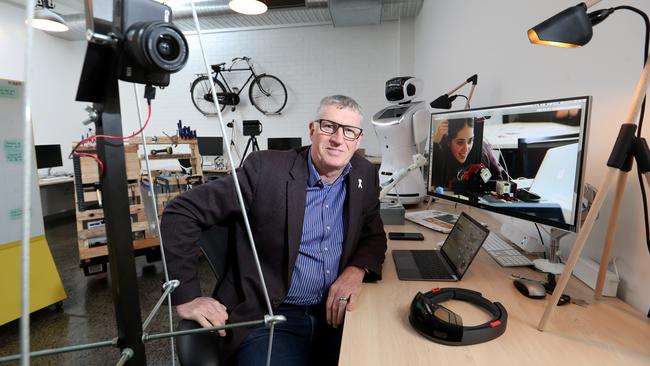REA Group chief inventor Nigel Dalton: keeping a house full and happy
For REA Group’s chief inventor, Nigel Dalton, the secret to success lies in diversity of teams.

Nigel Dalton works in an old mechanic’s workshop, tucked in a laneway in Melbourne’s inner-city Richmond. The workshop is filled with robots and other mechanical inventions, as well as electronic bits and bobs, designed to make our technological lives easier.
Dalton carries the title of chief inventor at REA Group, and part of his ability to retain top IT-trained talent across the company relates directly to his staff having the opportunity, several times a year, to invent things.
“People are very surprised by our commitment to hack days and inventor days, where 300 people across the company once a quarter are inventing new ideas,” Dalton says.
“That is the wages and salaries of people who aren’t working on their day job for 12 days a year, which costs us about $1 million in salaries. What we get back is new ideas and inventions, and we’ve had over 20. People love hack days — we’re famous for them.”
Dalton encourages his team to come up with apps and other digital inventions to make buying, renting or selling a house easier.
REA Group, a digital advertising company operating property websites in Australia, Europe, Southeast Asia and the US, has been leading the way with virtual reality in the housing market, thanks to Dalton’s creative workers.
Realising that virtual reality was becoming increasingly accessible, Dalton’s team at a hack day two years ago created 3D online models of houses, including those not yet built, by using computer-aided design programs.
They also created virtual reality “walk throughs” of houses, and have been working on an augmented reality real estate app, which Dalton describes as being “Pokemon Go with a real estate agent”.
“You’re using your phone to look at something in the space between the camera and the object,” he says.
“You can walk the dog in your own neighbourhood ... and see a “for sale” sign and stop. You can hold your phone up before a sign and a the real estate agent pops up, telling you about the house.”
Dalton says technologies such as the iPhone, introduced a decade ago, have revolutionised the industry, and new apps being designed are making it easier for consumers.
“We’re bringing to the market something that makes for very happy consumers. They don’t have to travel across Sydney or Melbourne at night to see a rental property that looks nothing like their photos.”
In an information technology workforce where people are shifting jobs every two or so years for better pay and new opportunities, Dalton says staff turnover is low at REA Group because of its team structure and how it values staff.
The company’s office environment is increasingly viewed locally as an ideal work environment, which other organisations are visiting to learn about collaboration and agile teams.
Instead of lumping all IT staff in one area, marketing in another corner, or sales teams on another floor, Dalton says people work in multidisciplinary teams.
“Everyone works in small teams. We have a residential team, commercial property group, developer, media and international groups, they have the full suite to serve customers,” he says.
“We’re four years into the process and we now have people with experience in marketing who have mastered product design with customer experience.
“Five years ago, if you asked an IT person where they worked, they would have said IT, but now they say they work in international or another team.”
Dalton says team alignment starts with good management, having the right structure in place, the right purpose, values and strategy. Those multidisciplinary teams come up with creative ideas for each market they work in.
“In my lab I don’t have designers, but we get together with our mobile team and say, ‘here’s the product, if you can provide a strategist and a designer, we’ll provide the engineer and we’ll get that to market’,” he says.
“It’s a fun place to work and it’s very satisfying as an employee. A little bit of that comes down to everyday work, the freedom to invent, have an opinion, and to voice that.”
The positive work environment and quarterly hack days mean Dalton and the executive team do not have to resort to offering crazy perks to staff to retain them, as is being done in the tight Silicon Valley market in the US.
Few Australian companies offer unusual or quick-fix perks to retain staff, but it can be difficult to retain talent and keep people from heading offshore. There is almost no limit to the perks being offered by US IT companies and by other tech-focused countries.
Known as perk-washing, the latest fads including telemedicine — where staff can connect to doctors via their phones during work hours — pet insurance, legal plans for potential divorces and wills, unlimited time off, workplace professional chefs, midday surfing in California, event tickets, game consoles, day spas, club memberships, free childcare and drinks fridges. Google is known for its chair massages, yoga classes, and haircuts. Other organisations offer breakfast bars, menu planners, improv classes, and a paid day off on birthdays.
Experts argue staff would rather have family friendly flexible hours than gym memberships and the odd free meal, or a pay increase.
Dalton says REA’s 12 days of abstract inventing a year go a long way to keeping staff interested.
Add in the rest of the time spent developing projects and creating apps and other tech, and Dalton’s staff are happy in their day jobs. He says it is not about paying them a tonne of money to stay — give them the right opportunities and they will naturally want to work at such an organisation.
“People come to see us to see what our secret is. The secret to success is the diversity of teams that work on customer problems and opportunities.”


